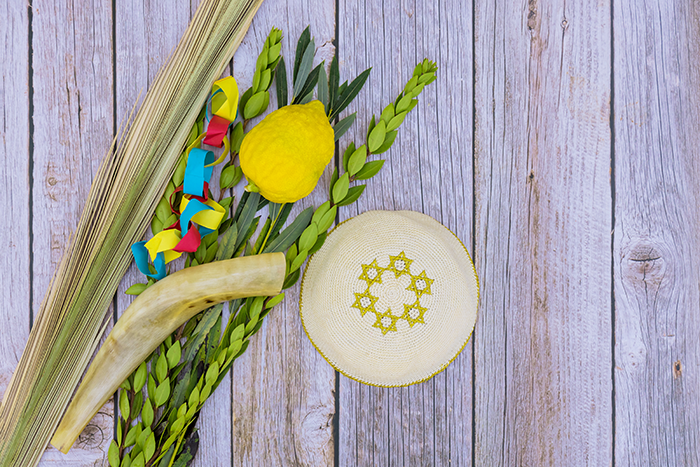At the very end of Yom Kippur, as the gates began to close and the sun set, we read together, “Our sages teach: As soon as the fast of Yom Kippur concludes, pound the first nail into the sukkah! To everything there is a season – a time for prayer and looking inward, a time to go outside and build.” As soon as the self-contemplation and internal work of Yom Kippur is concluded, we jump to the next mitzvah, the next opportunity to celebrate and engage with our community. Sukkot is a time of welcoming guests, of coming together in community, z’man simchateinu, the time of our rejoicing.
Although there seems to be such a thematic contrast between Yom Kippur and Sukkot, they share one very important Torah reference. In the Torah reading for the Shabbat of Sukkot, Moses asks God if he can behold God’s presence. God responds “I will make all My goodness pass before you, but you cannot see my face, for a human being may not see me and live.” God positions Moses in a cleft of the rock, and the back of God’s presence passes by. God proclaims what we call the divine attributes, which can be found in Exodus 34:6-7: “God, God, compassionate and gracious, slow to anger, abounding in kindness and faithfulness, extending kindness to the 1,000th generation, forgiving iniquity, transgression and sin” These divine attributes, which also appears in the Torah service for Yom Kippur and in the vidui, the confessional sections of Yom Kippur, are considered the most awesome characteristics of a compassionate God.
The musical setting that we sing on Yom Kippur of Exodus 34:6-7 is by Max Janowski, and it was the piece of music for the High Holy Days that I was the most intimidated by. We used to do it in Santa Fe but the choir director, a stunning tenor, would sing it, and I never thought that I was going to be the one to sing it. When I got the music here, I thought maybe I would have someone else sing it, but I brought it to my voice teacher, and she said, “Of course you can do this.” It was the piece that I worked on the most, and one that I was very proud of being able to do in our worship. I was even more proud to be able to stand next to the choir and hear them sing with me as the Torahs processed through our congregation. I felt the sense of awe of music and prayer in that moment. And I hope that other people felt that too. The music of the High Holy Days is intended to be majestic and awe inspiring. I am really grateful to have such a strong choir and musicians to work with. Each and every member of the choir added their voice to the holiness of our worship.
The Hebrew word used for “God’s back” in these verses is “Meachorai,” which could also be translated as what comes after God, what God has left behind in the world. We may not be able to see God’s face, but we can see the lingering remnants. In his Kol Nidre sermon, Rabbi Cohen talked about how important it is and how and how hard it is to find awe in an upside-down world where God seems to be hiding God’s face. He said, “What if the eclipse of the Divine allowed us to set off in search of the Divine?”
I often look for moments of awe, for evidence of what the Divine has left behind in this world in moments of music, and particularly in moments of music that bring people together. I experienced a lot of holy moments throughout Rosh Hashanah and Yom Kippur where I was able to see the congregation singing with me, or to see the congregation be moved by the music. In these High Holy Days I searched for the Divine in the moments that brought us together, in moments like seeing the sanctuary completely full and seeing all of the people coming together for this common cause, to be together and to lift our voices up together. That’s where I see what God has left behind in the world, and that’s where I see the compassion and the awe and all of the things that we hope to see in the High Holy Days. Shanah Tovah – I hope your 5785 is often to a great start, and that this year is filled with goodness, and togetherness, and holiness for all of us. And Chag Sameach! May this Sukkot really be a time of rejoicing.

